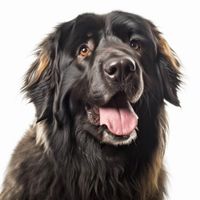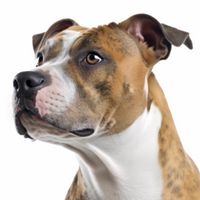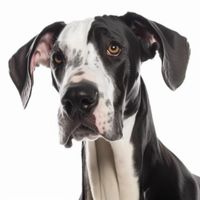Newfoundland - vs - American Staffordshire Terrier - vs - Great Dane
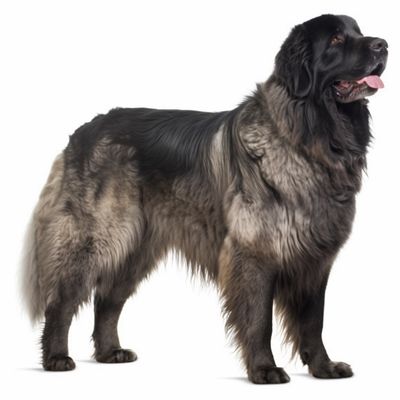
Newfoundlands are extra-large dogs, weighing 100-150 lbs, with a height of 26-28 inches.
Newfoundlands have a medium energy level and enjoy regular exercise, but they are not as demanding as some other breeds.
Newfoundlands require regular exercise, including daily walks and playtime, to keep them happy and healthy.
Newfoundlands are intelligent dogs, but they can be independent thinkers, making training moderately challenging.
Newfoundlands are intelligent dogs and are known for their problem-solving abilities.
Newfoundlands can adapt to various living situations, but they need enough space to accommodate their large size.
Newfoundlands are known for their gentle and protective nature towards children, making them great family dogs.
Newfoundlands generally get along well with other pets when properly socialized.
Newfoundlands are well-suited to cold climates due to their thick, double-layered coats.
Newfoundlands may struggle in hot climates due to their thick, double-layered coats.
Newfoundlands have seasonal shedding and require regular brushing to manage their thick coats.
Newfoundlands require regular grooming, including daily brushing and occasional trims, to maintain their thick, double-layered coats.
Newfoundlands bark occasionally, usually only when necessary or provoked.
Newfoundlands may have some health issues, requiring regular veterinary checkups and preventative care.
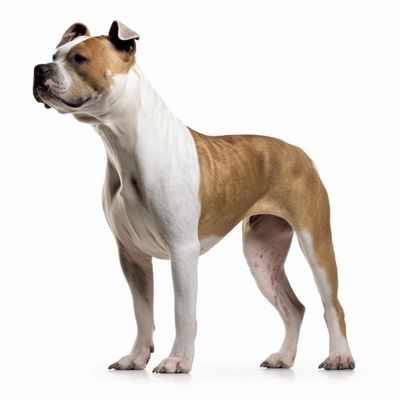
American Staffordshire Terriers are medium-sized dogs, weighing 40-70 lbs, with a height of 17-19 inches.
American Staffordshire Terriers have a high energy level and require regular exercise to stay happy and healthy.
American Staffordshire Terriers need a significant amount of exercise, including daily walks, runs, and interactive play sessions.
American Staffordshire Terriers are intelligent and trainable but can be stubborn at times. Consistent, positive reinforcement is key.
American Staffordshire Terriers are highly intelligent dogs and can excel in various dog sports and activities.
American Staffordshire Terriers can adapt to different living situations, but they need a responsible owner and consistent training.
American Staffordshire Terriers can be good with children when properly socialized and supervised. Their strength and energy require caution around small children.
American Staffordshire Terriers may have a strong prey drive and can be aggressive toward other pets. Early socialization and proper training are necessary.
American Staffordshire Terriers can tolerate colder temperatures, but they still need proper protection during extreme cold.
American Staffordshire Terriers can tolerate hot climates, but they need to be monitored for signs of overheating during exercise.
American Staffordshire Terriers have a short coat and shed minimally, making grooming relatively easy.
American Staffordshire Terriers require minimal grooming, including occasional brushing and bathing to keep their coats clean and healthy.
American Staffordshire Terriers have average bark tendencies and may bark for various reasons, such as alerting their owners or during playtime.
American Staffordshire Terriers may experience some health issues and require additional care and attention, such as regular veterinary checkups, preventative care, and potential medication or treatments.
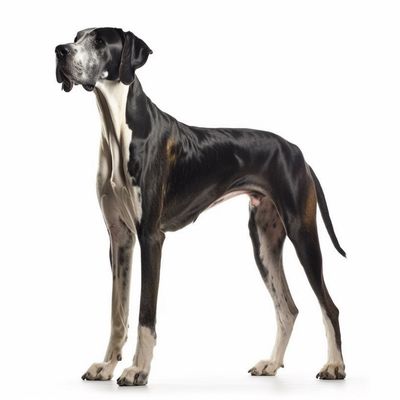
Great Danes are giant-sized dogs, weighing 110-175 lbs, with a height of 28-32 inches.
Great Danes have a medium energy level, enjoying daily walks and playtime but also appreciating relaxation time.
Great Danes need regular exercise, including daily walks and playtime, but should not be overexerted due to their size.
Great Danes are intelligent and trainable, but can be stubborn at times. Consistent, positive reinforcement is key.
Great Danes are intelligent dogs, capable of learning a variety of commands and tasks.
Great Danes can adapt to different living situations, but their size requires enough space to move comfortably.
Great Danes can be good with children due to their gentle nature, but their size requires supervision and proper handling.
Great Danes can get along well with other pets, especially when raised together. However, early socialization is important.
Great Danes can tolerate colder temperatures, but their short coats require proper protection during extreme cold.
Great Danes can tolerate hot climates, but they need to be monitored for signs of overheating during exercise.
Great Danes have a short coat and shed moderately, requiring regular brushing to manage shedding.
Great Danes require minimal grooming, including occasional brushing and bathing to keep their coats clean and healthy.
Great Danes bark occasionally, usually only when necessary or provoked.
Great Danes may have some health issues, requiring regular veterinary checkups and preventative care.

